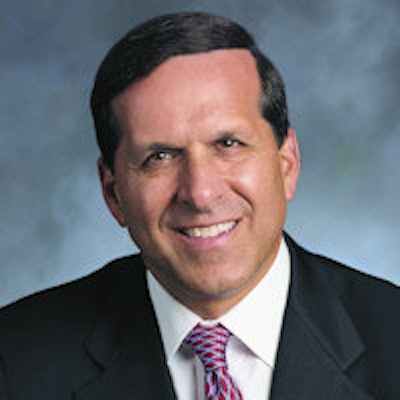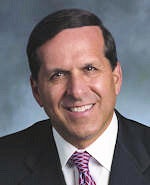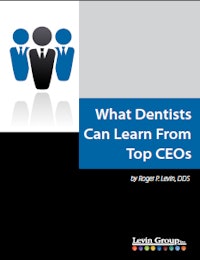
DrBicuspid.com is proud to present an excerpt from Dr. Roger P. Levin's latest book, What Dentists Can Learn From Top CEOs, which was published earlier this year. It draws together many of his observations about how techniques used by top corporate leaders can be applied successfully in dental practices. The following is an excerpt from the chapter "CEOs Build Value in the Business."
The complexities of practice valuation
 Roger P. Levin, DDS, chairman and CEO of practice management consulting firm Levin Group.
Roger P. Levin, DDS, chairman and CEO of practice management consulting firm Levin Group.The best CEOs are always highly conscious of the value of their companies. They measure it routinely so they can see where they stand, how their strategies are working, and whether any changes are needed. They look constantly for ways to build value. If it is a public company, this valuation process is made much easier by the fact that Wall Street analysts will ascertain value on a quarterly basis. For CEOs of dental practices, it is much more difficult to determine the value along the way.
Few dentists understand the complexity of a proper valuation process. There are many details to take into account and standards to be met, and the final valuation must be certified. It is a classic example of a task the dentist should delegate -- not to staff but to an outside expert. Few people are qualified to determine the value of a dental practice. Levin Group hires dental-experienced certified public accountants (CPAs) to perform practice valuations for clients. This is the only way to be sure that all accounting, tax, and other protocols are followed and that the unique requirements of operating a successful clinical dental business are recognized.
As CEOs, dentists should always be seeking ways to build value in their practices. Short of performing a formal valuation, you can approximate the real value of your practice by monitoring key parameters. Tracking key production indicators (KPIs) will indicate whether your practice value is increasing, flat, or decreasing, and it will also clarify ways you can increase practice value. Note that in performing valuations it is standard procedure to track KPIs over three years. This helps even out fluctuations and prevents practice owners from artificially inflating value by applying short-term corrective measures.
Production -- Practice production growing for three years generally indicates an increase in practice valuation.
Profit -- Profit matters more than production for the purpose of valuation. A practice can have high production undercut by high overhead, resulting in low profit and practice value.
Quality and reproducibility of systems -- Practices with excellent systems merit a higher practice value. It's a matter of sustainability.
Staff longevity -- The longer the staff has been with the practice, the higher the value. This also gives some idea of how long the staff might remain with the practice after the sale.
Staff training -- A well-trained staff increases practice value. If the practice has a staff that lacks training or experience, value suffers.
Physical space -- The condition of practice facilities influences practice valuation. If the practice looks modern and well-kept, it increases practice value.
Lease -- The lease is a critical factor in practice valuation. If a purchaser knows that a practice will have to be moved within a year or two of purchase, the practice value goes down to allow for the moving expenses.
Number of patients -- Most doctors believe the number of patients reflects the general health of a practice. Valuations do not take into account how much dentistry remains to be done within the existing patient base.
Number of overdue patients -- Not only do good CEOs want repeat customers, but they also understand that regular repeat customers increase the value of the business.
Fees -- Patients may be pleased that your fees are below average for your area, but a prospective buyer for your practice will see them as a liability.
Insurance percentages -- The practice's participation with insurance has a significant effect on valuation.
Accounts receivable -- Accounts receivable are a critical part of practice valuation. While production dominates in practice valuation, uncollected -- perhaps uncollectible -- money counts heavily against it.
 What Dentists Can Learn From Top CEOs by Dr. Roger Levin.
What Dentists Can Learn From Top CEOs by Dr. Roger Levin.All of the factors discussed here go to the heart of properly running the business on a day-to-day basis. Obviously, the factors that increase practice value also relate directly to achieving better practice performance. As a good CEO, you must pay attention to all these metrics and more.
Even if they have no plans to sell their businesses, CEOs rely on market valuation as one way to measure their performance. Dentists should do the same. In fact, I advise young dentists to think about practice value right from the start. If the value is increasing, it is a very positive sign that the dentist is doing a good job as a CEO.
Roger P. Levin, DDS, is the chairman and CEO of practice management consulting firm Levin Group.
Special for DrBicuspid.com members
Order What Dentists Can Learn from Top CEOs today and receive a $100 discount when you use code LG13100.
The comments and observations expressed herein do not necessarily reflect the opinions of DrBicuspid.com, nor should they be construed as an endorsement or admonishment of any particular idea, vendor, or organization.
Copyright © 2014, Levin Group, Inc. Reprinted with permission.



















